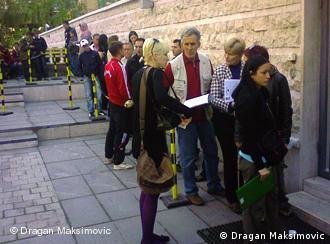
The EU Commission has proposed lifting the visa requirements for people from Serbia, Montenegro and Macedonia from next year. But Bosnian Muslims feel excluded - they will have to wait longer for open borders.
Sada Domanagic is a pensioner living in the capital of Bosnia-Herzegovina, Sarajevo. She wants to visit her sister in Slovenia, and she's applying for a visa. She finds it a humiliating business, especially as Slovenia, which is now part of the European Union, used to be part of Yugoslavia, just like Bosnia-Herzegovina.
She's had to get her sister to give a guarantee that she will take financial responsibility for her, she's had to prove that she has a flat in Bosnia, and she's had to send in her pension slips for March, April and May.
"And I'm a pensioner!" she says. "What must it be like for young people! If it weren't for the fact that I want to visit my sister, I wouldn't mess about with all this."
Bosnians suspect anti-Muslim discrimination
Amar Basic is a 24-year-old student of English literature. He's disappointed in the EU. He's a Muslim - a Bosniak - but he wants to put all the nationalist differences of the past behind him.
And he's worried that the decision to grant visa-free travel to Bosnia's neighbors will only cement the ethnic divisions in the country. Ethnic Serbs and Croats in Bosnia can apply for Serbian and Croatian passports, but the Muslims have no way out.
Basic has written an open letter to the EU in which he points out that Ratko Mladic, the former Bosnian Serb general who is wanted for war crimes, is entitled to a better passport than his victims.
"This creates this conception that the EU is anti-Bosniak or anti-Muslim or anti-victim," he says.
He has some support within the EU. For example, Daniel Cohn-Bendit, head of the Green group in the European Parliament describes it as "morally unacceptable."
He admits that there's a technical problem, in that, according to the Commission, the Bosnians have been unable to introduce the biometric passports which the EU requires.
"But it's still not on," he says, "that Bosnian Serbs will be able to benefit, and the only ones who can't travel are the Bosnian Muslims."
"Lack of political insight"
Christian Schwarz-Schilling, who served as the international community's high representative for Bosnia from May of 2006 to June of 2007, doesn't even believe that technical reasons are behind the discrimination. "I know that the progress in providing biometric passports is on the same level in Bosnia-Herzegovina as in Serbia," he told Deutsche Welle.
He argues that the problem is that the politicians of the mainly Serb entity within Bosnia, the Republika Srpska, refuse to hand over the control of their borders to the central government.
"This is not a technical matter," he says. "It's a highly political matter. There were wars and genocide 15 years ago [over these issues]. It just shows that in Brussels they have no political insight, and they don't care about the political situation of the people. It's the people that matter, and not the games of some political figures."
Schwarz-Schilling would like to see the EU put more pressure on Bosnia to sort itself out. He says until all the countries of the western Balkans can enjoy visa-free travel, the program should be delayed.
The same applies to Kosovo, where ethnic Serbs will be able to use Serbian passports while ethnic Albanians will have to wait in line at the embassies.
Meanwhile Sada Domanagic has had her appointment with the Slovenian embassy. She's got her visa, but it isn't valid until two days after she'd planned to travel.
"They wouldn't give me back my passport immediately," she complains. "They take their time, apparently, until they look through all the papers. I'm very annoyed."
Frank Hoffmann / Michael Lawton
Editor: Chuck Penfold
(Deutsche Welle)
No comments:
Post a Comment